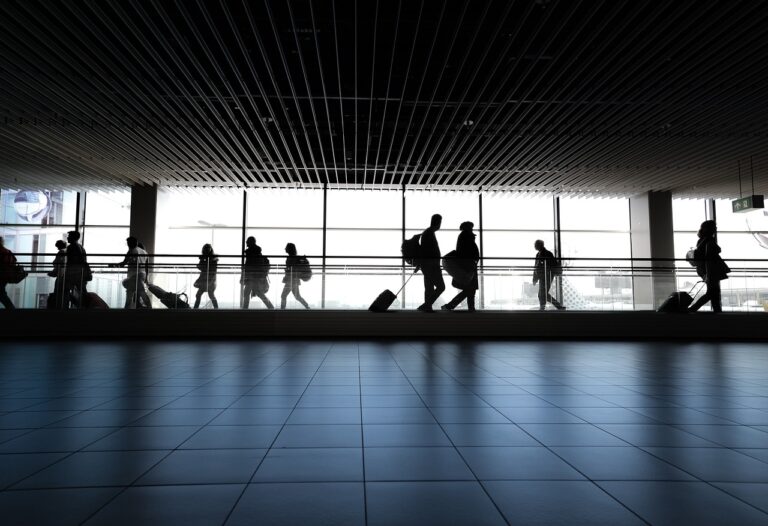The United States Federal Aviation Administration (FAA) is awarding US$970m from President Biden’s Bipartisan Infrastructure Law Investing in America agenda to 114 airports across the country, spanning 44 states and three territories.
The funding helps meet the growing demand for air travel and launches projects that will improve passenger experience, accessibility and sustainability while creating employment opportunities. Investments enhancing the passenger experience include new baggage systems, larger security checkpoints, increased gate capacity and the modernizing of aging infrastructure throughout terminals and ground transportation. These investments further increase terminal sustainability and improve accessibility for individuals with disabilities.
Many of the grants contain an element that will build new or expanded terminal facilities. Among them are:
- US$35m to Washington Dulles International Airport in Virginia. This award funds a portion of the construction of a 14-gate, 121,920m2 terminal building including connections to the AeroTrain and Metrorail.
- US$20m to Salt Lake City International Airport in Utah. This award funds a portion of the Concourse B terminal expansion that will include 16 gates.
- US$10m to Hector International Airport in Fargo, North Dakota. This award funds a portion of the rehabilitation and expansion of the existing terminal. Rehabilitation includes upgrades to lighting, reconfiguration and expansion of hold rooms, and improving Americans with Disabilities (ADA) compliance. Expansion includes four new gates (for a total of nine), increasing hold room space, expanded ticketing/baggage handling, expanded restrooms and post-security concessions.
Several grants contain an element that will improve the passenger experience by improving security screening areas, providing faster and more reliable baggage systems and increasing accessibility for passengers with disabilities. Among them are:
- US$40m to Chicago O’Hare International Airport in Illinois. This award funds improvements to Terminal 3 to include increasing the central passenger corridor width, a reconfigured TSA checkpoint, a new hold room, a new ADA-compliant and family restroom, and updates to the baggage system.
- US$26.6m to Denver International Airport in Colorado. This award funds a portion of the baggage handling system replacement, including the control system. In addition, the new system will improve energy efficiency and increase capacity.
- US$8.6m to Kahului Airport in Hawaii. This award funds the construction of a new two-story security screening checkpoint facility at the south end of the ticket lobby (South TSA Checkpoint). The facility will include six new TSA screening lanes. A pedestrian bridge will connect the new checkpoint facility to Hold Room A and will span the existing service road.
- US$7.5m to Louisville Muhammad Ali International Airport in Kentucky. This award funds a portion of the Terminal A security screening expansion project, which consists of adding four screening lanes to the security checkpoint.
- US$2m to Spokane International Airport in Washington. This award funds up to two additional ticket counters and passenger boarding bridges; portions of the HVAC, mechanical, electrical and plumbing upgrades; shared use and hearing-impaired technology; smart glass; solar energy connection; baggage handling systems; and other considerable ADA improvements.
- US$1.5m to Ted Stevens Anchorage International Airport in Alaska. This award funds the installation of 110 audio and visual monitors and stations throughout the terminal to better serve the passengers.
Other grants contain an element that will increase terminal sustainability. Among them are:
- US$31m to San Francisco International Airport in California. This award will replace critical mechanical and electrical components (VFDs, fans, dampers, actuators, control valves, sensors and other associated elements) of the HVAC system at the International Terminal. Replacing these components will improve fire-life safety compliance, reduce energy usage, reduce maintenance costs and improve resilience.
- US$27m to Charlotte Douglas International Airport in North Carolina. This award funds the replacement of up to 16 passenger boarding bridges and associated ground power units and pre-conditioned air units.
- US$3.4m to Appleton International Airport in Wisconsin. This award funds the Expansion and Modernization Project that includes a four-gate concourse expansion that will include an 18,288m2expansion increasing the number of gates to 10. This award will partially fund the final phase of the concourse expansion project, including passenger boarding bridges, a solar and sustainability program and mechanical equipment.
The funding also allows for grants that contain an element that will go to improving airport access in smaller communities. These include:
- US$10m to Punta Gorda Airport in Florida. This award funds a portion of the terminal rehabilitation and expansion project, which includes renovating the security checkpoint and adding public circulation, a hold room and restroom space.
- US$6.5m to Presque Isle International Airport in Maine. The airport will construct a new terminal to replace the existing undersized terminal. The new terminal will be ADA compliant, include appropriate life safety upgrades and will improve energy efficiency. This award will fund the early stages of the project, including construction of the superstructure and building enclosure.
- US$700,000 to Standing Rock Airport in Fort Yates, North Dakota. This award funds construction of a new general aviation terminal building. There is no current terminal building or other protective structure for pilots to get out of the elements. The airport is used for recreational activity along with flights for medical emergencies and delivery of hospital and emergency staff to the area.
Other grants will increase access to additional modes of transportation or improve roadways. In addition, nine grants will address the needs of aging air traffic control towers.
The funding is from the Airport Terminal Program, one of three aviation programs created by the Bipartisan Infrastructure Law and follows more than US$240m in funding for airport infrastructure grants. The law provides US$1bn annually for five years for airport terminal grants. In total, the Bipartisan Infrastructure Law has provided US$25bn to modernize US airport infrastructure.
For more on the Bipartisan Infrastructure Law, click here

